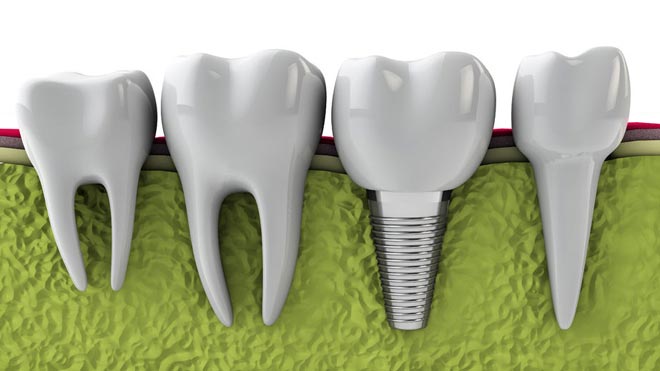The dental implant procedure is considered to be a part of artificial replacement treatment and cosmetic surgery. This process involves placing artificial roots to give support to the missing teeth and prevent bone loss. Giving back the confidence of a great smile and restoring dental health at the same time is what this treatment procedure helps in. Losing teeth has an impact on nutrition, general health, and also changes in eating patterns. Some also experience difficulty in speech due to tooth loss.
Tooth is lost due to tooth decay, accidents, trauma to the mouth, contact sports injury or any other birth defects. For all these issues, dental implants are the answer. Natural tooth loss is replaced by artificial tooth root that is stable and provides support for a long time. The best alternative to natural teeth is dental implants and there is no fear of them slipping off like other dental replacements.
The first stage
A dental consultation is the first step that determines the course of treatment. A dental professional either dentist or dental surgeon will examine teeth and gums and assess the condition of the oral cavity. Will oral health allow for the procedure, is this the suited procedure for the person, how will the prognosis be – all these questions are answered. After it is decided the dental implant procedure can be done, the dentist will give information on the treatment details. Doubts regarding the procedure, what all one needs to know and be careful about during this treatment are discussed during this session.
This procedure is performed under anaesthesia, as the jaw bone will be cut to place the root of the tooth. The whole procedure will be painless as it is done when numbness sets in. A titanium implant is placed in the bone structure. This will provide the strong support that is needed for the replacement tooth. After the titanium implant is placed, tissue is placed over it for proper integration and healing. This process takes around six months, where the place of surgery is healed and the root is in place for the next procedure.
After the healing is complete, the dentist will then place an abutment on the implant, this is for mounting the artificial tooth on. In some cases, placing the abutment is done along with placing the titanium implant. It is on this structure that the crown or the artificial tooth will be placed. Depending on how the dentist decides on the process, a temporary dental crown might be placed first and then replaced with a permanent one at a later time. The colour of the artificial tooth is chosen so that it mimics the natural tooth and there is no difference between the two. Replacement can be done for a single tooth or multiple teeth. In the second case, the implant will have abutments placed on the space where teeth are lost. Dental crowns or artificial teeth are then placed on these areas.
Types of implants
Based on the type of procedure that is performed there are single-stage or two-stage dental implants. In the single-stage procedure, the implant is placed as per the procedure detailed earlier and the implant cap is left visible and protected with a cap. The titanium structure is placed inside and is the gum tissue is stitched for healing. At a later time, the abutment and restoration can be done without removing the healed portion as the head is visible to place the prosthetics. In the two- stage procedure, the implant is placed inside the jaw bone and stitched. Later after healing, with a minor surgery this is removed to attach the abutment and restoration.
There are two different types depending on the position where the dental implants are placed. In the endosteal implant procedure, the implants are placed directly into the jaw bone. For placing the abutment, a small surgery will be required to place the abutment. In the subperiosteal dental implants, they are placed on the jaw bone just beneath the gum tissues. After healing, the implant becomes fixed to the jaw bone.
After dental implant surgery and care
As this is a minor surgery, pain and discomfort will be felt after the surgery. No pain is felt at all during the surgery as it is done under anaesthesia. But as the effect wears off, pain will be felt in the area of surgery. The pain though is not severe only something similar to tooth extraction is felt. Dentists will give medicines to tide over the pain. Placing a cold pack on the cheeks on the side of surgery will help to remove the discomfort felt. Besides the pain killers, antibiotics and oral rinses that will help with healing will also be given.
There is a possibility of peri-implantitis developing in some rare cases. This is similar to gum disease, in which the gum tissues in the area of the implant will be inflamed. This condition arises mainly due to the excessive force that is exerted on the gum tissues while biting chewing etc. Another reason will also be due to bacterial infection. In both situations it should not be avoided, treatment must be sought at the earliest.
Following proper dental hygiene and care after the procedure is a must along with follow-up sessions with the dentist. Any chances of infection or other possible issues can be set right during these sessions. During the procedure, dentists will also set right any bite issues that are there so that the implants do not take the major brunt of the chewing or grinding process. Smoking and using tobacco should be reduced greatly or stopped as this will interfere with oral health in general and especially in the healing process after surgery. Dental implants are the best procedure to go for if the oral/gum health is good. They offer a lifelong replacement option that is not guaranteed with other procedures.


